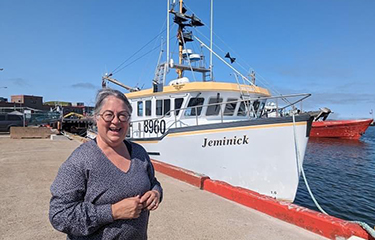Canadian Prime Minister Justin Trudeau announced sweeping changes to his cabinet on 26 July, including a change of leadership at the Canadian Department of Fisheries and Oceans (DFO).
Trudeau appointed Diane Lebouthillier to replace Joyce Murray as minister of fisheries, oceans, and the Canadian Coast Guard, and as such, she will take over management of the DFO. Murray announced on Twitter 25 July that she will not seek reelection.
“It has been a privilege to advance work in tackling climate change, nature conservation, and improving the lives of Canadians, and I look forward to continue engaging with these challenges,” Murray said.
Lebouthillier, a member of Canada’s Liberal Party, was previously the minister of national revenue and a member of parliament for Gaspésie and Les Îles-De-La-Madeleine, Quebec. She is familiar with key stakeholders in the fisheries sector, having recently met with seafood industry representatives on Magdalen Island.
The Canadian Aquaculture Industry Alliance welcomed Lebouthillier's appointment.
“With evidence-based science and innovative policy, there is much potential for sustainable aquaculture production in Canada,” CAIA President and CEO Timothy Kennedy said. “A robust, innovative aquaculture sector in Canada can produce more home-grown affordable, healthy, low-carbon and sustainable food, while contributing to conservation, and growing thousands of jobs to support healthy and dynamic rural, coastal and Indigenous communities that need and want to continue to participate and partner in this growing food sector.”
The BC Salmon Farmers Association, representing salmon farmers in British Columbia, also welcomed the new minister, and said it looked forward to discussing the country's salmon-farming industry's importance to the province with Lebouthillier.
“We understand Minister Lebouthillier is from a fishing community,” BC Salmon Farmers Association Executive Director Brian Kingzett said. “We appreciate the appointment of a minister that understands the opportunities and challenges of resource-based communities, especially in relation to the federal salmon farming transition plan.”
With Trudeau's approval, the DFO has made a push to establish a “net-pen transition plan” for salmon aquaculture in British Columbia. The plan was supposed to be released before summer, but Murray and the department quietly delayed its release. On 6 June, the department still hadn’t told the BC Salmon Farmers Association about the delay, days after the news broke in Canada's Globe and Mail on 31 May.
The push to close net-pen salmon farming in B.C. began under the previous minister of fisheries, oceans, and the Canadian Coast Guard, Bernadette Jordan, who first announced a plan to close all salmon farming in B.C.'s Discovery Islands in December 2020. That announcement gave local salmon farmers just 18 months to cease all activity, but before it could go into effect, a court decision overturned the rule.
Lebouthillier will thus be the third minister handling the aquaculture transition in as many years.
The aquaculture transition in B.C. is far from the only controversy roiling Canada’s seafood sector. Disagreements about prices in Newfoundland and Labrador's snow crab sector led to a six-week standoff, with the Fish Food and Allied Workers Union (FFAW) calling on the government to fix problems with the price-setting process. In recent years, FFAW has clashed with the Association of Seafood Producers (ASP) – which represents processors in the region – in government-led negotiations over prices.
The FFAW and the ASP had initially agreed to cordial negotiations after a tumultuous 2022 that led to fishermen protests and calls for changes in management. However, negotiations failed in late March, forcing the price-setting panel to make a decision in favor of ASP.
After a standoff, fishermen eventually agreed to start harvesting in late May, but the long delay left them behind in fulfilling their quota, leading the DFO to repeatedly extend the season, which is now open through late July.
Conflict is also brewing between Canadian fishermen and petroleum drilling companies, with fishermen claiming existing government control boards ignored the requests of fishermen and are engaging in drilling that is in direct conflict with fishing activity.
“The continuous disregard for our industry can happen no more,” FFAW President Greg Pretty said. “Harvesters are extremely frustrated and feel an at-sea protest may be the only way forward in sending the message our membership will not allow the [Canada-Newfoundland and Labrador Offshore Petroleum Board] to enable one industry growth at the expense of another.”
Photo courtesy of Dianne Lebouthillier







